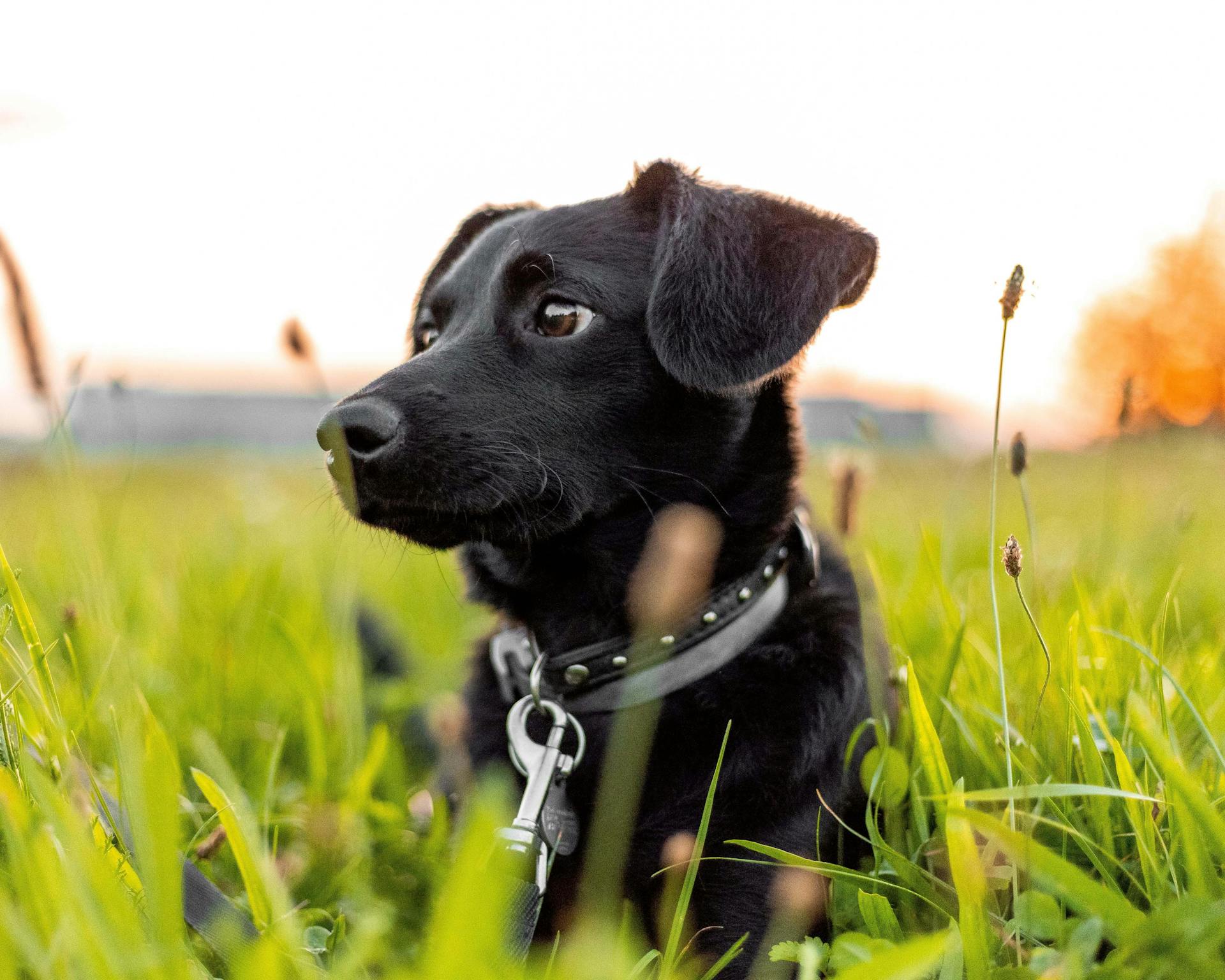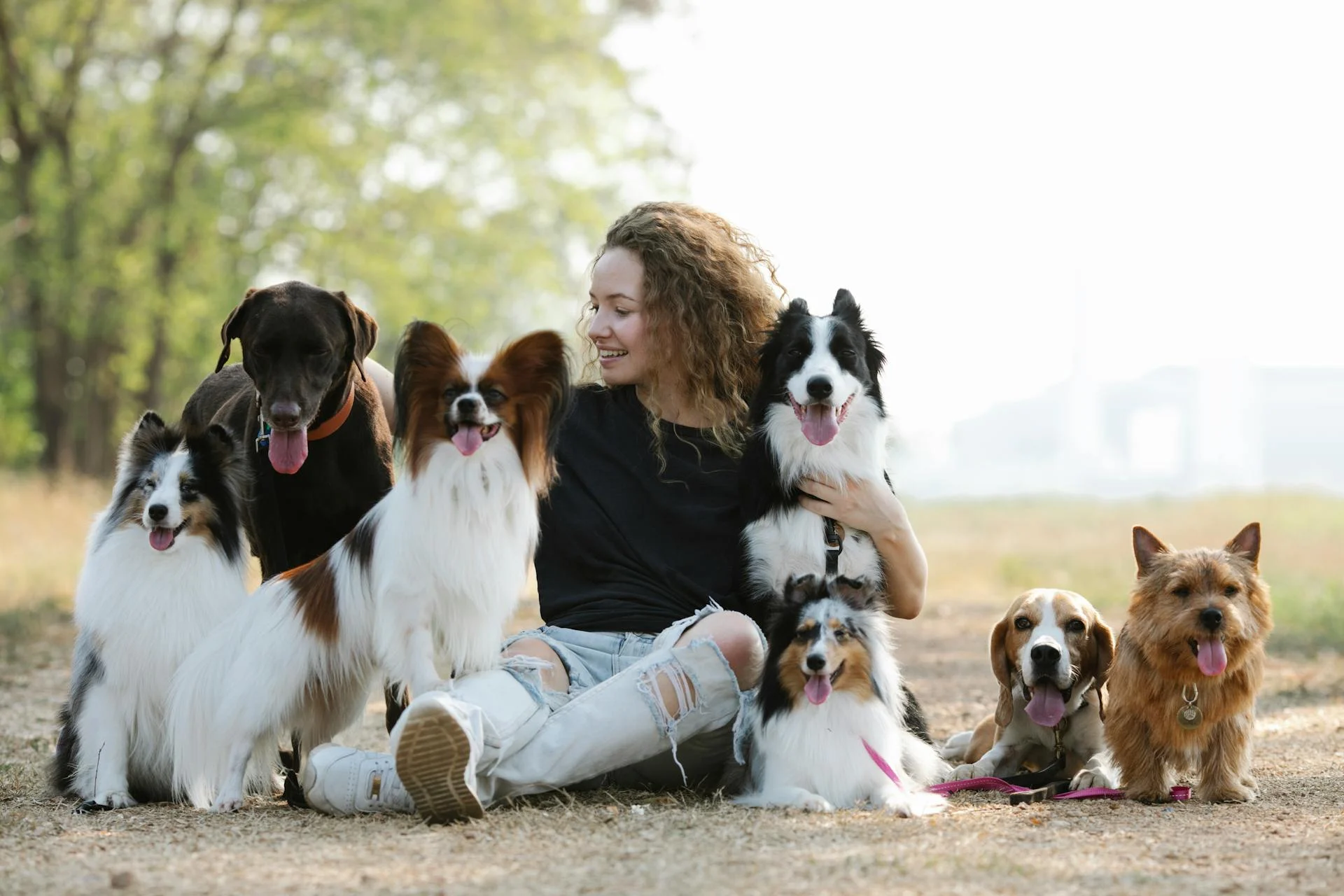
The Black Papillon dog breed is a rare and stunning companion that's perfect for those who want a loyal friend with a unique appearance. They have a distinctive butterfly-like ear shape and a silky, fine coat that comes in a range of colors including black.
Their small size, typically weighing between 7-11 pounds, makes them a great choice for apartment dwellers or those with limited space. Black Papillons are known for their gentle and affectionate nature, making them an excellent choice for families with children.
One of their most notable features is their large, dark eyes that are full of kindness and intelligence. With proper care and attention, Black Papillons can live up to 12-15 years, providing a long and loving companionship.
Temperament & Intelligence
Black Papillons are highly intelligent dogs, ranking among the top 10 most intelligent breeds in the world!
Their intelligence and love to please make them a joy to train, whether for obedience shows or in a relaxed home setting. They're a pleasure to have around, with happy dispositions and a love of playing games.
These tiny dogs can get along with almost anyone and any pet, making them a wonderful addition to many families. They're fun and energetic, and they adore being around people.
One thing to keep in mind is that Black Papillons can be pretty vocal, so if you live in an apartment with strict noise rules, you'll need to work on training them not to bark. They're loud and will bark frequently without proper training.
Despite their small size, Black Papillons are full of energy and affection, making them a great companion for active families. They'll keep up on hikes or long walks with ease, and they'll always be happy to curl up at your feet.
Owning a Pet
Papillons are good-natured dogs that typically get along with other dogs and pets in the house.
They prefer human companionship, so they thrive on interaction with their family members.
Early socialization will greatly increase the likelihood of Papillons successfully living with other pets.
Slowly introduce Papillon puppies to other animals to prevent them from feeling overwhelmed or stressed out.
Papillon puppies shouldn't be left unsupervised until a bond has formed between them and the other pet.
Papillons are relatively healthy and low-maintenance compared to other purebred dog breeds.
Their specific needs will help them thrive and bring out their fun personalities.
Since they are small, they can easily get bulldozed by a larger dog, so supervision is crucial.
Care & Maintenance
Grooming your black Papillon is a breeze. They only need to be brushed twice a week to prevent tangles.
Their long and silky fur can easily become matted if neglected, so it's essential to get them comfortable with grooming from a young age. This will save you both a lot of stress and prevent painful skin issues.
A Papillon's coat sheds minimally, but it's still a good idea to use a deshedding tool if you notice any shedding issues.
Food & Diet
Papillons are little dogs with lots of energy, so they need a high-quality food that caters to their needs.
Measuring out your Papillon's food and getting the best quality you can afford will keep them trim, and it doesn't take much to feed them, so buying in bulk will save you money.
Papillons are prone to low blood sugar (hypoglycemia) if they don't eat frequently enough, especially as puppies, so they should be fed frequently.
A high-protein diet is ideal for Papillons, as it will help them maintain their energy levels.
Papillons can eat between ¼ cup to ½ cup of food a day, depending on their daily exercise level.
You should avoid foods that are carb-heavy, as they can make it easier for Papillons to gain weight.
Working with your veterinarian to come up with the best meal plan for your Papillon is a great way to ensure they're getting the nutrients they need.
On a similar theme: Dog Eat Black Eyed Peas
Exercise

Papillons are very energetic and need to be exercised daily, so make sure to give them some playtime every day.
They'll do best with at least 40 minutes of exercise a day, which can be a combination of daily walks and playtime.
Daily walks are a great way to help them get some exercise and indulge their curiosity about the neighborhood.
Agility courses and dog parks with agility equipment can be an excellent way to keep them happy and active.
Just be mindful of large dogs and try to visit dog parks that have separate sections for large and small dogs.
Grooming
Grooming is a crucial aspect of Papillon care, and it's relatively easy to keep their long fur looking its best.
Brush your Papillon's fur at least once a week to prevent tangling, especially in areas like their ears, under their legs, and tail.
The Papillon's coat sheds minimally, but it's not considered hypoallergenic, so regular grooming is still essential.
To prevent skin issues and painful matted clumps, get your Papillon comfortable with grooming from a young age.
You can use a deshedding tool if you experience shedding issues, and a monthly bath should suffice if your Papillon doesn't get into anything dirty.
Use a gentle shampoo formula when giving your Papillon a bath, as some Papillons are susceptible to atopy.
Health & Genetics
The Papillon is a relatively healthy breed, but like any dog, they can be prone to certain health conditions. Arthritis, dental disease, and cryptorchidism/monorchidism are some of the health issues you should be aware of if you're considering bringing a Papillon into your family.
Genetics play a crucial role in determining the color of a Papillon's coat, with multiple genes controlling pigment distribution and type. This is why you can find Papillons in a variety of colors, including black, red, sable, and even rare colors like blue.
Some health conditions that can affect Papillons include patellar luxation, progressive retinal atrophy, and food allergies. Regular veterinary check-ups can help monitor these conditions and prevent them from becoming more serious.
Here's a list of potential health issues that can affect Papillons:
- Arthritis
- Dental disease
- Cryptorchidism/Monorchidism
- Open Fontanelle
- Luxating Patella
- Progressive Retinal Atrophy
- Seizure disorders
- Patellar luxation
- Progressive retinal atrophy (PRA)
- Food allergies
- Von Willebrand’s Disease (VWD)
- Intervertebral disk disease (IVDD)
Health and Conditions

The Papillon is a relatively healthy breed, but like all breeds, they can be prone to certain health conditions. Arthritis is a common issue in older Papillons, and it's essential to keep them comfortable and active.
Dental disease is another health concern in Papillons, so regular brushing and veterinary check-ups are crucial. Cryptorchidism/Monorchidism, which affects the testicles, is also a possibility.
Open Fontanelle, a condition where the skull doesn't close properly, is another health issue that can occur in Papillons. Luxating Patella, a kneecap disorder, can cause discomfort and pain.
Progressive Retinal Atrophy, a degenerative eye disorder, can lead to vision loss. Seizure disorders can also affect Papillons, and it's essential to work closely with a veterinarian to manage the condition.
Here's a list of some common health issues in Papillons:
- Arthritis
- Dental disease
- Cryptorchidism/Monorchidism
- Open Fontanelle
- Luxating Patella
- Progressive Retinal Atrophy
- Seizure disorders
It's essential to be aware of these potential health issues and work closely with a veterinarian to prevent or manage them. Regular check-ups and a healthy lifestyle can go a long way in keeping your Papillon happy and healthy.
How Genetics Affects Dog Color
Genetics plays a crucial role in determining a Papillon's coat color.
Multiple genes control pigment distribution and type in Papillons, determining colors such as black, red, sable, or rare colors like blue.
Breeding strategies can influence the prevalence of certain colors within the Papillon population by selecting for desirable traits according to breed standards.
The pattern and symmetry of markings in Papillons are also dictated by genetics, which are critical aspects of the breed's standard appearance.
Phantom coloration in Papillons, where the dog has distinct markings resembling theatre masks around the eyes and ears, is a notable example of how genetics affects their appearance.
Puppies
If you're considering bringing a black Papillon puppy into your family, be prepared for an energetic pup asking for playtime with their owners. Papillon puppies are as energetic as their adult counterparts.
Papillons are among the top 10 most intelligent dogs, according to Stanley Cohen's dog intelligence scale. This means they're fun to train, but also very mischievous.
You can find Papillon puppies from dedicated breeders, who also breed Phalenes in the same litter. Or, you might find a Papillon puppy in a rescue shelter.
It's essential to be wary of low-priced Papillon puppies, as they may be from unethical breeders or puppy mills. These puppies may end up costing you more due to health issues caused by inadequate living conditions.
Papillon puppies are great for first-time owners and make amazing companions for children.
Frequently Asked Questions
What are the two types of Papillons?
The Papillon breed comes in two ear variations: the upright Papillon and the Phalène with dropped ears. These distinct ear types are a key characteristic of this charming breed.
How rare is a Papillon dog?
The Papillon is a relatively common breed, but not as widely known as some other breeds. It's not considered rare, but rather a unique and distinctive breed worth learning more about.
Do Papillons come in black?
Yes, Papillons can have black patches on their coats, which can appear in combination with other colors. Black is one of the many colors that can appear in patches on a Papillon's coat.
How much is a Papillon dog worth?
A Papillon dog's price typically ranges from $500 to $1900, depending on factors like breeder reputation and lineage. The cost can vary significantly, so it's worth researching reputable breeders to find the right fit for you.
Featured Images: pexels.com


